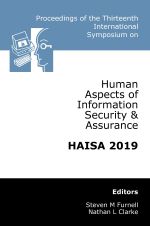In 2014, we launched our open-access repository which offers full text access to conference proceedings from many of our events including the INC and HAISA series. These papers are free to access and distribute (subject to citing the source).
» Openaccess proceedings » Thirteenth International Symposium on Human Aspects of Information Security & Assurance (HAISA 2019)
 | Thirteenth International Symposium on Human Aspects of Information Security & Assurance (HAISA 2019) |
Title: Users perception of using CBMT for information security training
Author(s): Joakim Kävrestad, Marie Skärgård, Marcus Nohlberg
Reference: pp122-131
Keywords: Information security, training, learning, user behavior, micro training, ContextBased MicroTraining, CBMT
Abstract: It is well established that user behavior is a crucial aspect of information security and archiving secure behavior through awareness and security training is the go-to solution proposed by practitioners as well as the research community. Thus, there is a dire need for efficient training methods for use in the security domain. This paper introduces ContextBased MicroTraining (CBMT), a framework for information security training that dictated that information security training should be delivered to end users in short-sequences when the users are in a situation where the training is needed. Further, the users' perception of CBMT in evaluated in an online survey where about 200 respondents are subjected to training material and asked about how they perceived them. The results show that users like the training material designed according to the CBMT framework and would prefer to use CBMT over other traditional methods of information security training.
Download count: 877
How to get this paper:


PDF copy of this paper is free to download. You may distribute this copy providing you cite this page as the source.
